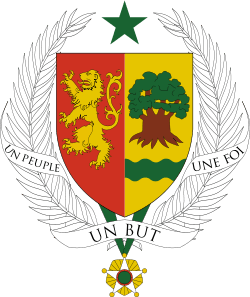Senegalese parliamentary election, 2012
 |
| This article is part of a series on the politics and government of Senegal |
|
|
Government |
Parliamentary elections were held in Senegal on 1 July 2012. The result was a victory for the United in Hope coalition supporting newly elected President Macky Sall, which won 119 of the 150 seats in the National Assembly.[1] Voter turnout in the election was just 37%.[1]
Background
Changes to the electoral law passed in 2010 made it mandatory for women to make up 50% of candidates on party lists.[2] A total of 24 lists were submitted for the election, with over 7,000 candidates,[2] including Laurence Gavron, the first white woman to run for election to Parliament.[3]
Of the 150 seats in the National Assembly, 60 were elected through proportional representation and 90 in constituencies.[2]
The election had originally been scheduled for 17 June 2012, but President Macky Sall announced a change of date after saying there was not enough time to prepare for it and that he had consulted the opposition Senegalese Democratic Party (PDS) on the move.[4]
Results
As a result of the new law on equal representation on party lists, 64 women were elected to the Assembly.[1]
| Party | Votes | % | Seats |
|---|---|---|---|
| United in Hope coalition[a] | 1,040,899 | 53.06 | 119 |
| Senegalese Democratic Party | 298,846 | 15.23 | 12 |
| Bokk Gis Gis | 143,180 | 7.30 | 4 |
| Citizen Movement for National Reform | 113,321 | 5.78 | 4 |
| Republican Movement for Socialism and Democracy | 70,655 | 3.60 | 2 |
| Party for Truth and Development | 48,553 | 2.47 | 2 |
| Union for Democratic Renewal | 21,964 | 1.12 | 1 |
| Senegalese Patriotic Movement | 21,868 | 1.11 | 1 |
| Patriotic Convergence for Justice and Equity | 20,762 | 1.06 | 1 |
| Party for the Emergence of Citizens | 20,671 | 1.05 | 1 |
| Deggo Souxali Transport ak Commerce | 18,859 | 0.96 | 1 |
| Leeral Coalition | 17,791 | 0.91 | 1 |
| And-Jëf/African Party for Democracy and Socialism | 15,889 | 0.81 | 1 |
| Democratic Alliance | 14,841 | 0.76 | 0 |
| And Taxawal Askan Wi coalition | 12,922 | 0.47 | 0 |
| Wallu Askan Senegal coalition | 12,044 | 0.61 | 0 |
| Rally of the Ecologists of Senegal | 11,783 | 0.60 | 0 |
| Salam coalition | 10,855 | 0.55 | 0 |
| Authentic Socialist Party | 9,577 | 0.49 | 0 |
| Lii Dal Na Xel coalition | 9,216 | 0.47 | 0 |
| Taxawu Askan Wi Party | 8,107 | 0.41 | 0 |
| Synergy for Progress and Democracy | 7,326 | 0.37 | 0 |
| Allied Coalition of the People | 6,717 | 0.34 | 0 |
| Citizen Democracy | 5,130 | 0.26 | 0 |
| Invalid/blank votes | 7,076 | – | – |
| Total | 1,968,852 | 100 | 150 |
| Registered voters/turnout | 5,368,783 | 36.67 | – |
| Source: African Elections Database | |||
a The United in Hope coalition included the Alliance for the Republic.[5]
Aftermath
The pro-Sall United in Hope coalition won an overwhelming majority of seats in the National Assembly, 119 out of 150, while the PDS saw its share of seats plummet to only 12. The remaining 19 seats were distributed amongst an assortment of small parties. On 30 July 2012, one of Sall's most prominent allies, Moustapha Niasse, was elected as President of the National Assembly; he defeated a PDS deputy, Oumar Sarr.[6] Niasse received 126 votes against 17 votes for Sarr; there were three blank votes.[7] Eight vice-presidents were elected, including Awa Guèye as First Vice-President and Moustapha Cissé Lô as Second Vice-President.[8] None of the vice-president posts went to a deputy from the opposition, leading it to complain that the majority had excluded it and ignored parliamentary tradition. While the opposition Liberals and Democrats Parliamentary Group was too few in number to guarantee it one of the posts, the opposition nevertheless felt that it should have been given a post for reasons of tradition and "dignity".[9]
References
- 1 2 3 Senegal's President Macky Sall wins national assembly landslide BBC News, 5 July 2012
- 1 2 3 Women to get equal shot in Senegal elections Jakarta Globe 1 July 2012
- ↑ A first white woman stands in Senegal's elections The Sun Daily, 1 July 2012
- ↑ Technocrat to be Senegal’s new prime minister Al Jazeera, 3 April 2012
- ↑ Ba, Diadie (1 July 2012), "Senegal's Sall seen winning parliament vote", Reuters
- ↑ "Senegal's Niasse elected parliament speaker", AFP, 31 July 2012.
- ↑ "Moustapha Niasse élu président de l'Assemblée nationale", Agence de Presse Sénégalaise, 30 July 2012 (French).
- ↑ "Les vice-présidents de l'Assemblée nationale élus", Agence de Presse Sénégalaise, 30 July 2012 (French).
- ↑ "Absence de l'opposition : Fada dénonce une entorse à la tradition parlementaire", Agence de Presse Sénégalaise, 30 July 2012 (French).